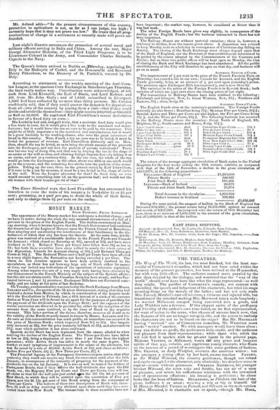According to statements at the weekly meeting of the Anti-Corn-
law League, at the spacious Corn Exchange in Manchesteron Thursday, the fund really makes way. Contributions were acknowledged, of 50/. each from Lord Kinnaird,•the Earl of Ducie, and Lord Radnor, and 201. from Mr. John Gully ; and of 1,850/. subscribed in Liverpool, 1,500/. had been collected by no more than thirty persons. Mr. Cobden confidently said, that if they could answer the demands for deputations from all t arts of the country by paying them a visit—that if they could divide and subdivide themselves—they might receive 200,000/. or 300,000/. as *ell as 50,000/. He combated Earl Fitz william's recent' declaration in favour of a fixed duty on corn- ing Lordship had said, andiaid truly, that a moderate fixed duty would give a free trade in corn, for it would give a free trade to the merchant and manu- facturer; but it would leave the tax on corn to be paid by the consumer. This might be of little importanre to the merchant and manufacturer, but it would be a great hardship to the working-classes, who were the great consumers of bread in this country. Now, Wench a tax on corn was to be levied, it must be levied for purposes of revenue. Earl Fitzwilliam distinctly said so. How, then, should the tax be levied, so as to bring the whole amount of the proceeds into the Exchequer' and not into the pockets of private individuals? There was but one way of doing this, and that was by levying the tax in the shape of an excise at the mill or oven, and allowing foreign imports free—by taking it as an excise, and not as a enstorns•duty. In the one case, the whole of the tax would go into the Exchequer ; in the other, about one-fifth or one-sixth would go to the revenue, and the remaining five-sixths into the pockets of the mono- folists. Taking up the case, then, on the ground stated by Earl Fitzwilliatn, if it were to be a tax for revenue, it must be a tax levied in the shape of excise at the mill. Were the League advocates for that? 8s. fixed duty on corn would amount to something near Id. on the quartern loaf; and would not the old women with their brooms get rid of that ?


























 Previous page
Previous page